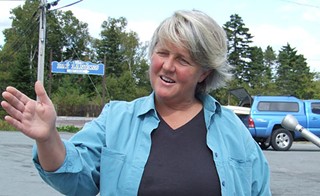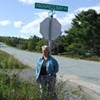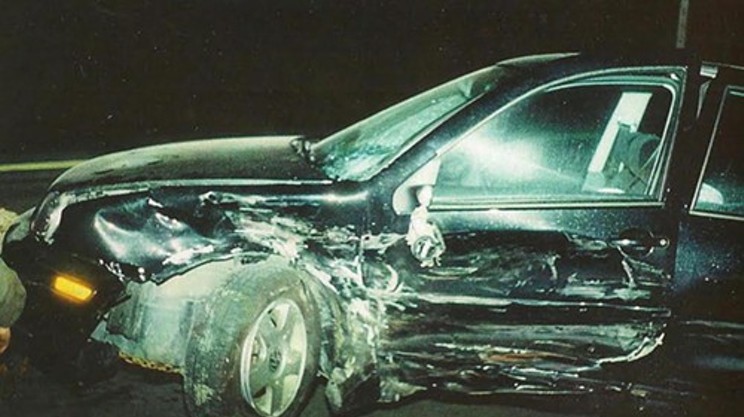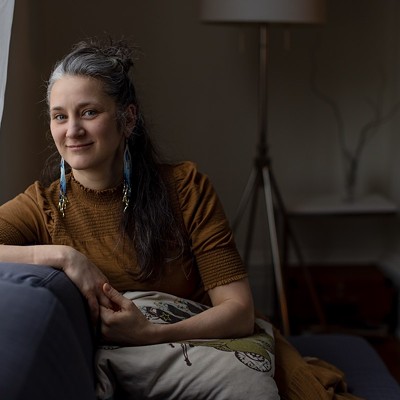On the evening of December 13, 2000, May Ocean made a fateful decision to stop for bread, eggs and milk at Prospect Foods, a small grocery store near her home in Whites Lake, 25 kilometres south of Halifax. At about 6:30pm, the then-43-year-old Ocean, driving her brand-new Volkswagen Golf, pulled out of the store's parking lot for a left turn to head south on Prospect Bay Road. She was partway across the road when she saw a set of headlights rounding a curve and barrelling toward her at 90 to 100 kilometres-per-hour in a 70-kilometre zone. Ocean stepped on the gas to get across the road into what she thought was the safety of the southbound lane, but it didn't matter.
"I looked and the lights were coming straight at me on my side of the road," Ocean says. "I knew that impact was inevitable. I couldn't avoid it at that point. I thought: I'm dead, game over, goodbye cruel world."
Ocean laughs. But she knows there's really nothing funny at all about the hell she has endured since the collision---failing health, fears for her own and her grown children's safety, looming financial ruin and an expensive and bruising legal battle with her insurance company, Economical Mutual, one of Canada's largest. Ocean is suing Economical for $700,000, partly because of what she sees as the company's bad faith in handling her case. As her lawsuit drags on and on, she is nearing the end of her tether.
"Slowly, I'm being beaten down. I'm losing money. I am losing energy," Ocean says. "If I sat there and looked at the horror of what I've been facing all the time, I'd go insane."
Justice delayed
The story of May Ocean's collision and its epic nine-year aftermath is embedded in tens of thousands of pages of court documents---volume after volume containing pre-trial court transcripts, medical records, accident reports, sworn affidavits, judicial rulings and even May Ocean's controversial writings about evolution and language. These mountains of paper are striking evidence that the wheels of justice in cases like this can grind so slowly, they hardly move at all. Lawyers and judges may thrive in this system, but for accident victims, justice delayed is justice denied.
Ocean's case has become a marathon endurance test partly because the insurance company has fought her at every turn, denying responsibility for her injuries and losses; seeking to have her case dismissed when she missed deadlines for filing extensive financial records and even challenging her sanity.
At the heart of May Ocean's case lies one crucial fact: The 22-year-old who smashed in the driver's side of her car, sending her vehicle and his hurtling into a ditch, carried no insurance. Ocean walked away from her wrecked car thanks to side airbags and reinforced steel doors. The young man ended up in hospital with serious injuries.
But here's that crucial fact again: Drivers involved in an accident with someone who has no insurance must turn to their own companies to cover injuries and damages, and that's why Ocean was forced to depend on Economical Mutual.
"Never in my wildest moments would I have thought I would have a problem with my insurance company," she says. "I was preyed on as a victim of an accident by the very people who are supposed to protect you."
Ocean acknowledges that the insurance company did replace her car and pay for physiotherapy and psychotherapy treatments. It was required to do so because the other driver had no insurance. Yet Ocean is furious that Economical is still blaming her for the accident and denying she suffered any injuries or losses because of it.
The issue of Ocean's injuries and losses is a crucial one. At first, Ocean herself believed that aside from minor aches and pains and recurrent nightmares, she was OK. But five months after the crash, she was diagnosed with Post-Traumatic Stress Disorder. Her PTSD is at the centre of her lawsuit. Ocean feels it has devastated her life. She says she still suffers from depression, nightmares and insomnia. Physically, she says, an injury to her right thumb, hand and wrist that she originally thought was only a sprain, turned out to be ligament damage affecting her whole arm. Ocean is an award-winning designer who moulds and casts pewter products. But now, she can work for only short periods. That's partly why, she says, her business, Ocean Art Pewter, has all but collapsed, going from almost a million dollars in annual sales and 20 employees to the edge of bankruptcy and one part-time worker.
Ocean says the heightened awareness or hyper-vigilance that is characteristic of PTSD led her to make two major scientific discoveries about where language came from and how modern human beings evolved from perfectly conjoined twins. But when she submitted her writings outlining her theories to the courts as proof that she suffers from PTSD, her insurance company used them as evidence that she suffers from a mental disorder.
Ocean claims negligence
The insurance company's questioning of her sanity is only one in a long list of examples that Ocean cites to show why she believes Economical behaved negligently in handling her case right from the start. She is suing the company for $700,000 in damages, a written acknowledgment she suffers from PTSD and a formal apology. None of her claims have yet been proven in court, but Ocean says she's determined to expose the workings of the insurance system.
In answer to a question from Economical's lawyer that she has filed with the courts, Ocean states: "It is my claim that vehicle insurance companies and certain other government organizations form a conglomeration of joint activities that serve to uphold a corrupt system." In another court brief, Ocean writes about what she calls "the monopoly/conglomerate system at work within the insurance system."
On its website, Economical says, "We make one simple promise to all our customers: we'll be there when you need us most. When disaster strikes, you can count on The Economical Insurance Group to take care of the details so you can get on with your life." But Ocean says Economical was definitely not there for her. She says, for example, that in spite of her repeated phone calls immediately after the accident, Economical didn't seem willing to investigate the crash. Ocean feared she was being blamed for the accident, so she was anxious to get a formal investigation to prove the other driver was at fault.
"Why weren't they looking into the accident?" she asks. "Why wasn't anybody doing anything about this guy who hit me on my side of the road? Why did the police not look into this further?"
(An RCMP accident report that Ocean obtained through a court order several years after the accident suggests police believed both drivers were at fault. Yet the report reveals that the Mounties didn't really investigate. They didn't even speak with the other driver until he phoned them two months after the accident asking for information about filing an insurance claim. The police then laid charges against him for driving without insurance and operating an unregistered vehicle. Court documents show the 22-year-old had been convicted of impaired driving about a year and 10 months before the crash.)
Eventually, Ocean's phone calls to her insurance company finally seemed to pay off. Economical hired a forensic engineering firm to investigate. In a report dated July 16, 2001, professional engineer Stuart Smith concluded the other driver was entirely at fault, travelling way over the speed limit, veering into Ocean's lane and failing to brake in time to avoid the collision.
In spite of the accident report exonerating her, Ocean's troubles were far from over. Economical refused to renew her insurance policy, claiming it wasn't willing to insure two women under 25 who worked as drivers for Ocean's pewter company. Ocean's insurance broker warned her that no other company would cover her unless Economical wrote a letter clearing her of blame for the accident. Without that letter, the only insurance Ocean could get was through a fund for high-risk drivers at an unaffordable premium of $10,000 per year. She complained to the Better Business Bureau, the Insurance Bureau of Canada, the Superintendent of Insurance and the provincial cabinet minister in charge of insurance, but no one would help her. "It is obvious," Ocean wrote in a letter to the judge hearing her case, "these individuals and organizations are there after all for that purpose---paid by our hard-earned tax dollars, to be vigilant, to protect the little guy---their average Joe/Jane public from illegal activity such as this kind of blatant bullying and exploitation. So why did they not offer to do something immediately on my/our behalf?" Ocean concluded she had been "red-flagged" as a reckless driver by an insurance monopoly in which big companies work together at the expense of victims.
Ocean threatens hunger strike
Several months later, in a desperate attempt to get her insurance back, Ocean threatened to stage a hunger strike outside Economical's offices in Bedford. The tactic worked. Gordon Murray, Economical's branch manager, wrote her a letter in March 2002 apologizing for the handling of her claim. He also sent a letter to Ocean's broker stating the company believed the other driver was at fault. That lifted the "red flag" from her file and Ocean was able to get insurance from another company. But she was far from happy. She felt Economical was mishandling her case and still wasn't willing to compensate her fully for her injuries. She says she refused to accept a $25,000 settlement offer from the company.
After her lawyer filed a lawsuit for damages against Economical in December 2002, the company took a hard line against her. It filed a formal defence blaming her for the crash and claiming that she suffered no injuries, losses or damages because of it. It also maintained she had no valid insurance policy at the time of the accident---a claim it finally withdrew last year.
It all seemed incredible to Ocean. Why would the company deny she suffered any injuries when it had agreed to pay for her to see a physiotherapist and a psychologist? Why was she now being blamed for the crash when Economical's own accident report had cleared her and its branch manager had written a letter saying the company believed the other driver was at fault? Patricia Mitchell, Economical's lawyer, declined to answer these questions for The Coast, saying the public court documents speak for themselves.
Meantime, Ocean says her fight with Economical worsened her PTSD and the fears arising from it. In a 2006 letter to her lawyer, she wrote: "I beg the court to regard all of the injustices doled out by Economical as they bullied and threatened me over these last years since the accident." Gradually, she says, she began to fear for her own safety and the safety of her adult children. Several things happened that worsened her fears. Answering questions from Economical's lawyer during one hearing, Ocean testified, for example, that a driver swerved into her lane on the highway and drove right at her, veering away only at the last moment. A blond man in a trench coat approached her in a Toronto library, handed her a magazine opened to a report about mysterious damage done to one of the Queen's cars and said, "This is an interesting article. You need to read it," then walked away.
Stepping in when a Lawyer quits
Ocean's case was still winding its long, tortuous way through the civil court process in 2006, when a crisis suddenly erupted. Economical sought to have the case dismissed on the grounds that Ocean had missed deadlines for providing it with years of detailed financial information about her failing pewter company. Ocean was struggling to pull the figures together when she made a discovery that shocked her. She found out that when her lawyer first launched her lawsuit back in 2002, he had not claimed damages for the company's negligence and bad faith in handling her case. For her, that was the whole point of the lawsuit. She says when she refused to sign papers allowing the case to proceed without the negligence claim, her lawyer quit. Ocean phoned and faxed a number of other law firms but no one would agree to represent her.
Ocean has been waging her lawsuit on her own for the last three years, consulting legal texts at Dalhousie's law library, pleading her case during an endless string of pre-trial hearings, filing extensive court documents and subpoenaing and questioning witnesses. When the Supreme Court of Nova Scotia finally set a trial date in September 2008, nearly eight years after the accident, Ocean believed she might finally get her day in court. Her case seemed to be going well in spite of her lack of legal training. Economical had not been able to get her case dismissed and Deborah Smith, the Supreme Court judge handling the pre-trial hearings, appeared to have leaned over backwards to help her. But in the days leading up to the trial, Ocean suffered a huge setback, one that would delay her case for at least another full year, require her to undergo the humiliation of a court-ordered psychiatric examination and force her into a costly appeal.
Ocean "delusional"
Economical Mutual Insurance had been questioning May Ocean's sanity since January 2005, when she was ordered to undergo a two-hour psychiatric examination paid for by her insurance company. Halifax psychiatrist Edwin Rosenberg diagnosed Ocean with "delusional disorder, persecutory type." He wrote that the disorder was rooted in her anger at Economical and her belief that the company was involved in a wide-ranging conspiracy against her. When Ocean cross-examined Rosenberg during a pre-trial hearing, he testified he charges $300 an hour for his services and handles between 10 and 20 cases a year for insurance companies. In 2005, he billed Economical $3,600 for his work on her case.
In 2006, Economical's lawyer asked Rosenberg to assess the writings Ocean had filed as evidence she was suffering from the heightened awareness or hyper-vigilance characteristic of Post-Traumatic Stress Disorder. The psychiatrist responded that her writings about conjoined twins and the root language of mankind confirmed his original diagnosis adding that they conveyed "self-importance and grandiosity." In 2008, after Economical asked him for a further assessment, Rosenberg swore an affidavit in which he concluded there had been "a serious and dramatic escalation" of her original delusional disorder. His affidavit states Ocean suffers from "a blurring of fantasy and reality" that "would necessarily interfere with her ability to represent herself in court."
Ocean says the writings Rosenberg referred to arose from her attempts to alleviate the devastating effects of her PTSD. To cope with her depression, sleeplessness and the stress of fighting her insurance company, she began telling herself fictional stories and later, writing them down. Gradually, she says, the stories led her to make what she believes are two major scientific discoveries, the first about a parallel, inner world---the world of our perfectly conjoined twin. Ocean developed the hypothesis that modern human beings evolved from Siamese twins so completely joined that they appeared to be one.
Over time, one twin retreated into an invisible realm, a world as vibrant and complex as our own. Ocean says we have mistakenly called this invisible realm our unconscious mind. But it's really a separate world of twins who send us messages, which explains such things as telepathy, extra sensory perception and the penetrating insights of genius.
Ocean postulates that the year 2000 was a significant turning point as the second or twin millennium was about to begin. It was then that the inner twin world began to give our outer one more obvious clues to its hidden existence using what she calls "synchronistic events," or meaningful coincidences. Ocean says the collapse of New York's Twin Towers on 9/11 is one of the most spectacular, but others are all around us. She points for example, to a Herald article about a two-toned lobster---one side green, the other brilliant orange. And a news story about two Sea King helicopters whose engines caught fire on the very same day, leaving flight safety investigators baffled.
"This is the way it is with us," Ocean has written. "Our inner twin world has been trying to reach us---to teach and guide us in their 'clearer' way, but we have been ignorant and oblivious."
Root language of mankind
Ocean made a second discovery as she wrote fiction to relieve her PTSD. She believes it was inspired by her own inner twin. Ocean says our prehistoric ancestors built an advanced civilization that may have lasted up to 40,000 years on the permafrost of northern Eurasia.
"These ancestors designed and built a system of enclosed geodome homes (large enough for small clans) which they buried in a thick bed of insulating peat," Ocean writes. She adds they composted reindeer meat in each home's central tower to generate heat and methane gas---a set-up modelled on the body's digestive system. They collected the gas in expandable seal skin bags and later burned it as fuel when they herded, hunted and trekked north. "This move [north] would cause a variety of other changes," Ocean writes, "for instance, their long history of using sign language would give way to vocal language as the preferred mode of communication (saving vulnerable fingers from frostbite)."
Ocean believes modern languages are derived from this first spoken language as our ancient ancestors imitated the sounds gas makes when it is collected and burned. The letter "p", for example, is made by pursing the lips and forcing out air, giving rise to modern words like "puff" or "spent," while the letter "s" imitates the "hiss" of burning gas. Ocean says the words we use also reflect this ancient language. As one of scores of examples, she says that the English word "vent," as in venting gas, is related to "venison," the deer meat composted to produce the methane. And the French use "ventre" to mean stomach, a key digestive organ.Ocean believes her discoveries could be as significant as Charles Darwin's theory of evolution, but she knows they resulted from horrible experiences---the trauma of the accident and the stress, fear and panic she has suffered during her endless legal battle with Economical Insurance.
"My writings are a source of great hope and joy for me," she says. "Almost as though they were a child, but a child born of rape nonetheless."
Ocean trips over words
Court transcripts show that as the September 2008 trial date approached, Supreme Court judge Deborah Smith was becoming increasingly uneasy about Ocean's mental state and her ability to represent herself in court. The issue came to a head in the summer of 2008 when Ocean sought to amend the original claim her lawyer had filed to add one for what she saw as the company's negligence in handling her case. Economical argued it was too late for that. Ocean countered she had found a law that said time limits could be extended if someone making a claim had been "incapable" of making it sooner. She said she'd been sick, under stress, suffering the effects of PTSD, struggling to keep her business afloat, all the while battling her insurance company.
Trying to be helpful, Justice Smith pointed out that the word "incapable" is used in Ontario law, but the term here is "incompetent." That's when Ocean made a crucial mistake. Failing to realize that the legal meaning of "incompetent" referred to her mental state, she told the judge that she was feeling so overwhelmed and physically ill that she did not feel mentally competent "at this point in time," but added she fully intended to proceed with the trial in September.
The judge eventually ordered Ocean to get a written opinion about her mental state from her family doctor. Ocean submitted a single-sentence, handwritten note scribbled on a prescription pad by family doctor Saroj Premsagar. It certified that May Ocean "is competent to represent herself in court."
The insurance company, armed with Dr. Rosenberg's affidavit and pre-trial testimony, told the judge only a few days before the trial that the doctor's note wasn't good enough. It asked her to take a highly unusual step: Order Ocean to undergo another psychiatric examination before any trial could begin.
"I have an obligation as a trial judge to help to insure that the parties to this action receive a fair trial," Justice Smith ruled. "The evidence that has been presented satisfies me that it is appropriate to order a psychiatric examination of Ms. Ocean."
Ocean appeals
Ocean was now near the end of her tether. She'd been forced to sell land to keep her legal battle going. Now, she was back to square one. She decided to begin the complicated process of appealing the judge's order. "Even with the horrors that surround me, I am a survivor," she wrote in the overview of her case she filed with the NS Court of Appeal. "I will persevere though it is not easy."
Once again, Ocean compiled several thick volumes of documents to support her appeal. "The first thing I want is to know that my children will be safe," she wrote in her summary, adding, "I want my life back." She also said she wanted a lawyer and an RCMP or CIA investigation into the insurance system. "This kind of corrupt power cannot last," she wrote, "it's as simple as that."
Due to the slowness of the appeal process, Ocean was forced to undergo the psychiatric examination in early 2009. Her case was heard by the Court of Appeal in May. On July 17, the three judges ruled that their Supreme Court colleague had been wrong to order a psychiatric assessment at the request of Ocean's insurance company. Ocean had won an important victory. The psychiatric report could not be used as evidence that she is unable to represent herself in court. But Ocean says her appeal was a disaster financially. The Appeal Court ordered Economical to pay $4,000 to cover her costs, but she estimates the appeal actually cost her $10,000.
The Appeal Court judges noted that Ocean had conducted her case in an articulate and coherent manner, and praised her "effective" cross examination of Dr. Rosenberg. But the judges also predicted her case might not run smoothly. "She files volumes of material, much of it unhelpful and unnecessary, and is seemingly unable to narrow the issues," they warned. "As is the case with many self-represented litigants, she will likely have a great deal of difficulty putting her case forward in an effective or efficient way."
Nearly nine years after her accident, May Ocean is once again back at square one. At her request, new trial dates have been set beginning in September 2010. She says that will give her time to raise the money she needs to continue her battle. Ocean knows she's fighting a big company with deep pockets and skilled lawyers. More than a year ago, Justice Smith pointed out that if she fails to win her lawsuit, she could be ordered to pay Economical's court costs. "Tens and 10s of thousands of dollars can be awarded against you in costs, if you are unsuccessful," the judge warned.
Ocean herself is philosophical. "I had no idea what a hornet's nest I was stepping into," she says. "I want very much to believe that fairness is out there somewhere."



















